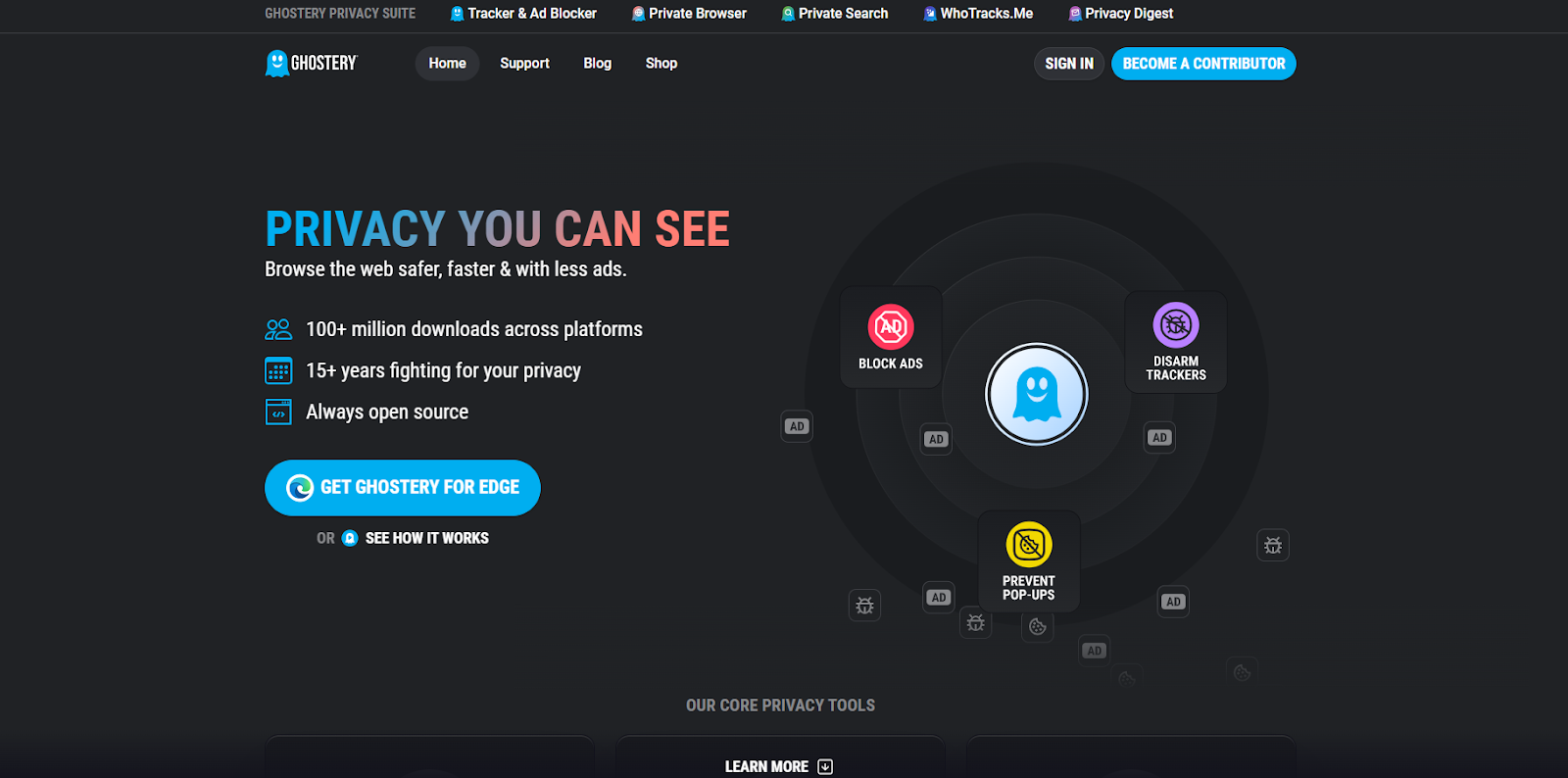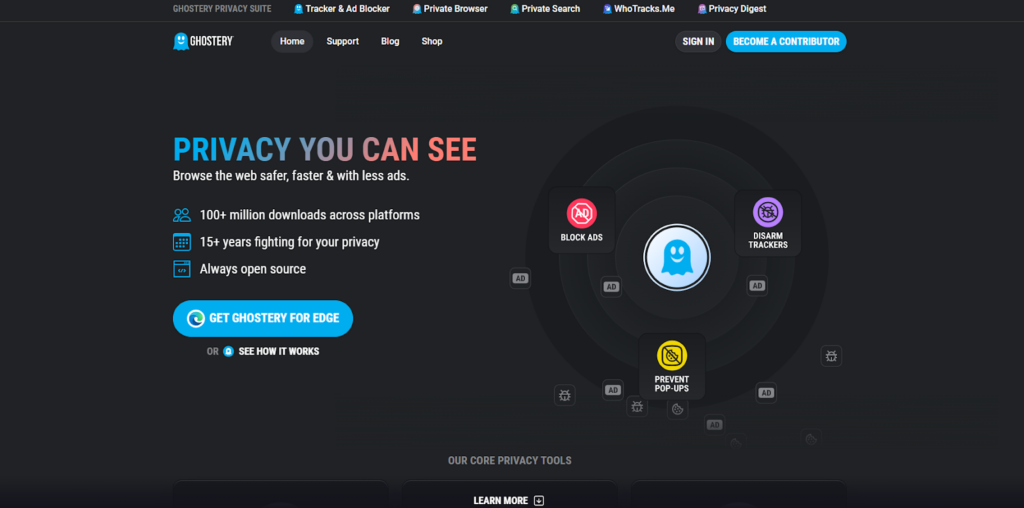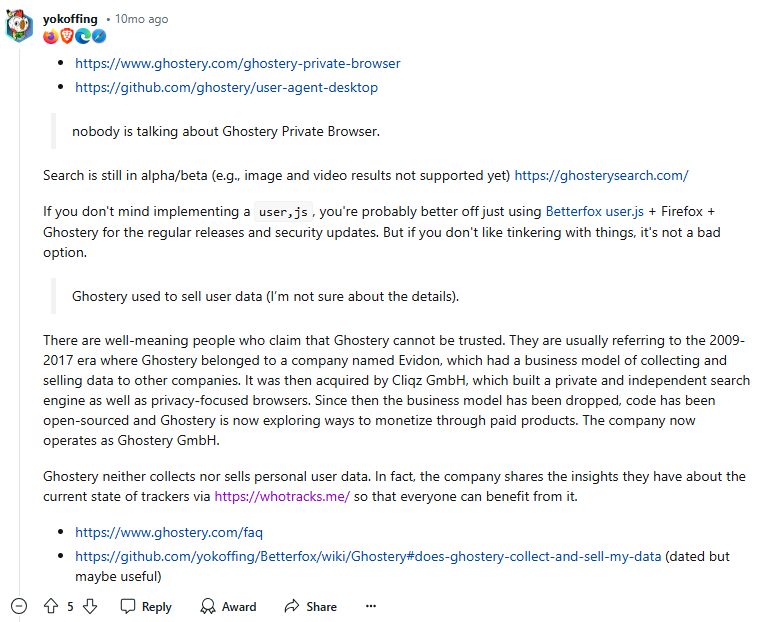Is Ghostery Safe?
Laura Martisiute
Reading time: 5 minutes

Table of Contents
If you use or plan to use Ghostery, you need to know: Is Ghostery safe?
Below, we explain whether Ghostery is:
- Safe to use.
- Good for privacy.
We also look at some steps you can take to improve both your safety and privacy when using this online service.
What Is Ghostery?
Ghostery is a privacy-focused web browser extension and mobile browser app designed to give users more control over their online privacy and security.

It detects and blocks tracking technologies (such as cookies, scripts, and web beacons) used by websites to monitor user behavior, helping prevent advertisers and other third parties from collecting personal data and browsing habits.
Ghostery also includes ad-blocking capabilities, reducing the number of intrusive ads displayed while browsing.
By blocking trackers and unnecessary scripts, Ghostery can improve page load times and overall browsing performance. The extension provides detailed information about the trackers it blocks on each website, allowing users to understand which companies are trying to track their online activity.
Users can customize their blocking preferences, choosing to block or allow specific trackers or types of trackers depending on their privacy needs and the functionality of the websites they visit.
Ghostery also offers its own in-house web browser (the Ghostery Private Browser) with integrated tracker and ad blocking.
Is Ghostery Safe?
Ghostery is a reputable browser extension and mobile app that enhances user privacy and security online. It has been around since 2009 and has a generally positive reputation within the privacy community.
It is widely used and reviewed by privacy experts and tech publications.
Parts of Ghostery’s codebase are open source, allowing the community to review and contribute to its development and helping to ensure the integrity and security of the extension. It is regularly updated to address new tracking techniques, improve functionality, and patch security vulnerabilities.
In 2018, Ghostery sent a mass email to users without hiding the email addresses it was sending the email to. Several Reddit users noted this event (many of whom stopped using Ghostery), which effectively leaked the emails of 500 users in Europe.
Is Ghostery Private?
Depends on your definition of “private.”
Ghostery is designed to block trackers and does not collect personal data about your browsing habits.
It offers various privacy-enhancing features, such as tracker blocking, anti-tracking technologies, and customizable privacy settings, all of which aim to protect user data and reduce exposure to online tracking.
By default, Ghostery uses advanced anti-tracking technologies to anonymize user data, making it more difficult for trackers to build profiles based on online activities.
In the past, Ghostery was criticized for its revenue model. Under Ghostery’s previous ownership by Evidon, it had a feature known as GhostRank. This feature, which users could choose to enable, collected data on the ads they encountered and blocked by the extension. This information was then sent back to advertisers, who could use the data to modify their ads in a way that might avoid being blocked in the future.

Ghostery is transparent about its data collection practices. The company provides detailed information about how the extension works, what data it collects, and how it handles user privacy in its privacy policy.
At the time of writing, review sites such as Terms of Service; Didn’t Read, and the Common Sense Privacy Program had not assessed Ghostery’s privacy policy.
How to Improve Your Safety and Privacy On Ghostery
Follow the steps below for a more private and secure experience on Ghostery.
- Customize blocking preferences. Open the Ghostery settings and customize which trackers you want to block. You can choose to block all trackers or select specific types, such as advertising, analytics, or social media trackers.
- Enable enhanced anti-tracking. Turn on Ghostery’s enhanced anti-tracking features. This helps to anonymize your data, making it harder for trackers to create a profile based on your online behavior.
- Regularly update Ghostery. Ensure that you keep Ghostery updated to the latest version. Updates often include new tracker definitions, feature improvements, and security patches.
- Use Ghostery’s ad-blocking feature. Enable the ad-blocking feature in Ghostery to prevent ads from loading. This reduces the number of potential trackers and enhances your browsing speed and experience.
- Enable Smart Blocking. Smart Blocking allows Ghostery to automatically adjust blocking settings based on the site you are visiting. This helps maintain website functionality while maximizing privacy.
- Review and adjust trust settings. Occasionally, review your list of trusted sites. You can allow certain sites to bypass blocking if you trust them or need them to function correctly, but be selective to maintain a high level of privacy.
- Use the Ghostery dashboard. Regularly check the Ghostery dashboard to see which trackers are being blocked, and adjust your settings as needed. This gives you a clear picture of your privacy landscape.
- Block all third-party cookies. In your browser settings, block all third-party cookies. Ghostery can help with this, but ensuring your browser is configured to block these cookies adds an additional layer of privacy.
- Combine with other privacy tools. For a comprehensive privacy strategy, use Ghostery alongside VPNs, HTTPS Everywhere, and privacy-focused search engines like DuckDuckGo.
Our privacy advisors:
- Continuously find and remove your sensitive data online
- Stop companies from selling your data – all year long
- Have removed 35M+ records
of personal data from the web
Save 10% on any individual and
family privacy plan
with code: BLOG10
news?
Don’t have the time?
DeleteMe is our premium privacy service that removes you from more than 750 data brokers like Whitepages, Spokeo, BeenVerified, plus many more.
Save 10% on DeleteMe when you use the code BLOG10.

















